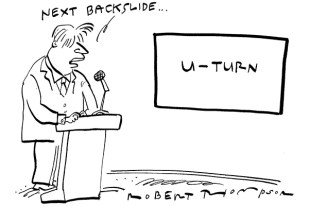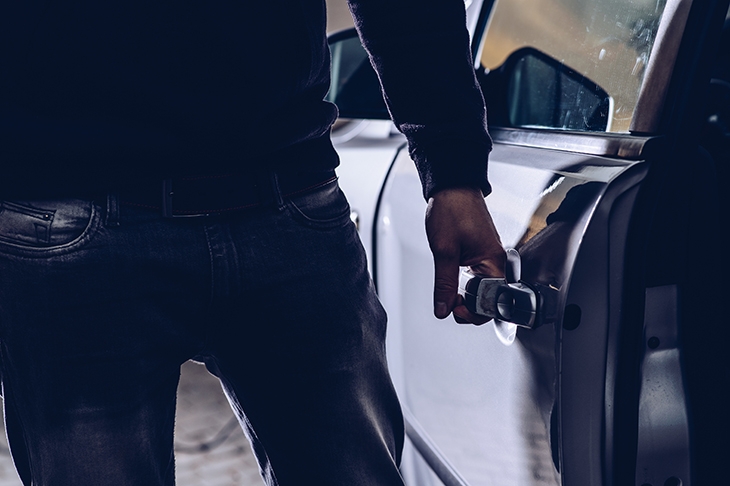‘Where’s the car?’ said my wife Alice, interrupting my Zoom meeting on Saturday morning. ‘It’s where you left it,’ I said perhaps more pointedly than was kind. ‘When you drove it home last night. On the drive.’ ‘No it isn’t,’ she said.
I left my Zoom meeting, shambled to the front of the house and looked out of the window. She was right. Half-full skip, yes. Wheelie bins, yes. The usual pizza boxes, empty vodka miniatures and crisp packets scattered outside our house by generous pedestrians? Present and correct. But no car.
‘It’s been stolen,’ I said gloomily and, of course, I was right. Much of the next couple of days was spent on hold to the insurance company and the Met — both of whom seem in a spirit of ecumenism to be keen on respecting both the Jewish and Christian Sabbaths. I was relatively stoical about this, but I can’t say I was happy. I love that car.

It isn’t all that fancy but it’s a bit fancy: a Land Rover Discovery Sport. It’s the first car I’ve ever owned that I actively like. It’s good for transporting a family of five and occasional hangers-on. When it’s cold the seats — miracle of slightly creepy miracles — warm your bottom. And when you push on the accelerator while heading uphill, unlike our last motor, it goes faster rather than on strike. I thought it probably wasn’t so fancy as to attract the attention of thieves. I was wrong. Our neighbour’s CCTV caught a glimpse of a so-far-unidentified tracksuited toe-rag climbing in and driving off at quarter to five in the morning. The whole process took about 15 seconds.
It is, it seems, almost comically easy to steal these hi-tech keyless cars. And the fancier the car, the easier it is to steal. Even as my Land Rover was discovered parked on a street in Ilford with the electronics mangled and the interior smelling richly of weed, my old mucker Giles Coren was having his Jaguar I-Pace nicked for the umpteenth time. Keyless theft is all the rage, and the Met — who, along with the insurance company, came up trumps in the end — tell me that practically every car stolen these days is a Range Rover, a Land Rover or a Jag.
The reason Jeff Bezos can fly to space is that everyone in the world can no longer be arsed to go to the shops
There are three different ways they can do it apparently. Relay theft is where they sneak up to the front of your house with a gizmo that picks up the signal from your key and boosts it, so the car thinks the keys are next to it and obligingly starts. There’s cloning — where, left alone with your key fob, a no-good garage employee makes a copy so they can pinch your wagon at their leisure. And there’s one, I’m told, where they somehow intercept the signal and clone the key when you open your car in a supermarket car park. Security-wise, we can say at the very least, this technology is a bit suboptimal.
But you can’t blame the manufacturers — or at least not totally. They have intuited, and the market has borne out their intuition, that people will love the convenience (and, let’s admit, swank) of owning a car where you just need to have the key in your pocket to jump in and drive off. You don’t need to be a technical expert to imagine there might be some security implications to that sort of mechanism. But the convenience is all the average buyer could really be bothered to notice.
This is a baleful sign of the times. Peter Cook once imagined the UK ‘sinking giggling into the sea’, but I suspect it’s not frivolity that will do for civilisation as we know it, so much as laziness. The ordinary Briton is now bone bloody idle. He (we) will trade anything — security, stability, the continuing ownership of his car — for the most marginal increases in convenience. This is perhaps what, were we Kremlin apparatchiks of the old school, we might call ‘Vestern decadence’.
The reason Jeff Bezos can fly to space on his own dime is, essentially, that everyone in the world can no longer be arsed to go to the shops. The reason we’re all so fat and ill is that, as a population, we can’t be bothered to shop and cook, preferring food that’s pre-prepared and (in the case of much of it) barely requires the effort of chewing. The reason there’s a floating patch of garbage the size of Texas in the middle of the Pacific Ocean is that single-use plastic is just so marvellously convenient.
We have created a global digital panopticon with our data being used against us in all sorts of sinister and imaginative ways, because nobody can be bothered to read the terms of service before clicking ‘Accept’. Yes, yes, I’ll accept cookies — now let’s see her off Love Island in her smalls. Disinformation, too: a study a few years back found that more than half of people who shared a link on social media didn’t so much as click it before doing so. And we had in Dominic Raab, let’s not forget, a Brexit secretary who couldn’t be bothered to read the 32-page Good Friday agreement all the way through.
‘CBA.’ ‘TL;DR.’ ‘Whevs.’ The important virtues and accomplishments are difficult and time-consuming. But much in the culture, and most of the economy, both here and abroad, is actively designed to militate against them. Not being bothered is the keynote of modern Western life — which, of course, presents some fantastic entrepreneurial possibilities for the minority who can be bothered. They draw up those terms and conditions. They craft those beguilingly simple culture-war narratives. They negotiate those treaties which say things in black and white that essay-crisis-prone counterparties might not get around to reading before they sign.
And, of course, they nick our cars. Since the convenience economy is excellently even-handed, we now make it pretty easy for them; heaven forbid your modern thief be forced to learn anything so difficult as a criminal trade. Luckily, the ones who took mine couldn’t be bothered to find the telematic tracking device, so it all worked out in the end.







Comments